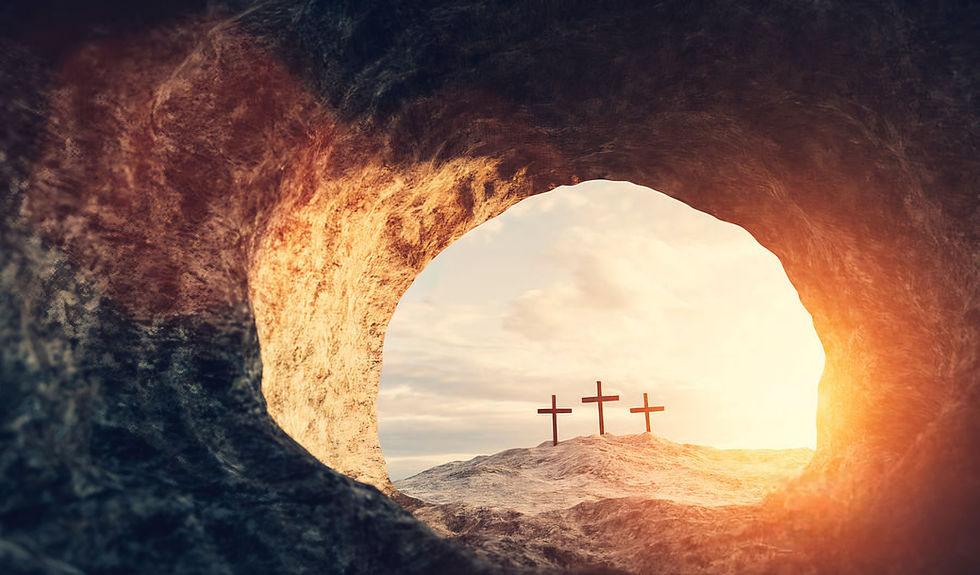Trilogy of the Lost
- Crossfire

- Oct 2, 2022
- 7 min read
Updated: Oct 3, 2022

”Now the tax collectors and sinners were all gathering around to hear Jesus. But the Pharisees and the teachers of the law muttered, “This man welcomes sinners and eats with them."
Then Jesus told them this parable: “Suppose one of you has a hundred sheep and loses one of them. Doesn’t he leave the ninety-nine in the open country and go after the lost sheep until he finds it? And when he finds it, he joyfully puts it on his shoulders and goes home. Then he calls his friends and neighbors together and says, ‘Rejoice with me; I have found my lost sheep.’ I tell you that in the same way there will be more rejoicing in heaven over one sinner who repents than over ninety-nine righteous persons who do not need to repent. Or suppose a woman has ten silver coins and loses one. Doesn’t she light a lamp, sweep the house and search carefully until she finds it? And when she finds it, she calls her friends and neighbors together and says, ‘Rejoice with me; I have found my lost coin.’ In the same way, I tell you, there is rejoicing in the presence of the angels of God over one sinner who repents.”
Jesus continued: “There was a man who had two sons. The younger one said to his father, ‘Father, give me my share of the estate.’ So he divided his property between them. Not long after that, the younger son got together all he had, set off for a distant country and there squandered his wealth in wild living. After he had spent everything, there was a severe famine in that whole country, and he began to be in need. So he went and hired himself out to a citizen of that country, who sent him to his fields to feed pigs. He longed to fill his stomach with the pods that the pigs were eating, but no one gave him anything.
When he came to his senses, he said, ‘How many of my father’s hired servants have food to spare, and here I am starving to death! I will set out and go back to my father and say to him: Father, I have sinned against heaven and against you. I am no longer worthy to be called your son; make me like one of your hired servants.’ So he got up and went to his father.
But while he was still a long way off, his father saw him and was filled with compassion for him; he ran to his son, threw his arms around him and kissed him. The son said to him, ‘Father, I have sinned against heaven and against you. I am no longer worthy to be called your son.’ But the father said to his servants, ‘Quick! Bring the best robe and put it on him. Put a ring on his finger and sandals on his feet. Bring the fattened calf and kill it. Let’s have a feast and celebrate. For this son of mine was dead and is alive again; he was lost and is found.’ So they began to celebrate.
Meanwhile, the older son was in the field. When he came near the house, he heard music and dancing. So he called one of the servants and asked him what was going on. ‘Your brother has come,’ he replied, ‘and your father has killed the fattened calf because he has him back safe and sound.’
The older brother became angry and refused to go in. So his father went out and pleaded with him. But he answered his father, ‘Look! All these years I’ve been slaving for you and never disobeyed your orders. Yet you never gave me even a young goat so I could celebrate with my friends. But when this son of yours who has squandered your property with prostitutes comes home, you kill the fattened calf for him!’
'My son', the father said, ‘you are always with me, and everything I have is yours. But we had to celebrate and be glad, because this brother of yours was dead and is alive again; he was lost and is found.’”
What is the message in the Trilogy of the Lost?
In these three parables, Jesus focuses on three different situations that share a similar theme: something or someone was missing. Was Jesus intentionally repetitious to impress upon His listeners the value of reaching the lost? Or does each situation present a different aspect of redemption?
Perspective - Writer 1
I love that Luke took the time to set the stage, so to speak, before he began retelling Jesus’ parables of the lost. The tax collectors and sinners were all drawing close to Jesus. They desired to hear him and to learn more about the kingdom of heaven. Whereas, the Pharisees and Scribes stood at a distance and mocked Jesus. They did not believe they needed to hear anything he had to say. They were prideful and pious and comfortable in their own righteousness. In all their religious training, they had somehow missed that all our righteous deeds are like a filthy rag in light of God’s glory (Isaiah 64:6).
Jesus could have chosen to ignore the Elites and continued to speak to his primary audience, but Jesus never wastes a chance to teach. Instead of straightforwardly stating his sermon, Jesus disguises it in three short and nuanced stories. In the three stories, he portrays four versions of lostness but only three versions of restitution and celebration.
His first story concerns a lost sheep that wanders away from the flock. Distracted by the world around him, he likely doesn’t even realize how far away he has strayed until it is too late to find his way back. The Shepherd knows how easily the sheep can go astray so he sets out to look for the lost sheep. He rescues him and returns him to the fold. The Shepherd and his friends all celebrate that the sheep is back amongst the others.
He continues by describing a situation where a woman loses one of her ten coins. The coin being inanimate, can’t know that it is lost in the darkness. The woman takes the initiative to illuminate the darkness and persistently sweeps away the dirt until she finds the missing coin. She, too, calls all her friends to celebrate the restoration of the missing one.
The final story tells of two lost sons but only one restoration. The younger son willfully rejects his father and walks away into a far country to live his life as he chooses. He soon realizes that what he thought would bring him joy and satisfaction only brought him pain and misery. So he humbly returns to his father who accepts him with open arms. This story is a little different from the others in that the lost finds his way back on his own and finds the father waiting expectantly and patiently. Without delay the father runs to the son, forgiving and restoring all to him. With great joy he calls together all for a great feast to celebrate the son's return.
Sadly, yet very pointedly, Jesus ends the stories with the older brother. The brother who, just like the Pharisees believed that he deserved his father’s love because he had earned it through his own effort. In the end, he was no different than the younger brother. He desired his father’s possessions and wealth more than his love. In his selfishness, he rejected both his brother and his father, just as the Pharisees standing near Jesus were doing.
Perspective - Writer 2
In the first two parables, Jesus dealt mainly with the role of the Redeemer – the woman who searched diligently for the lost coin and the shepherd who rescued his sheep at great risk. But in the third illustration – the story of the lost son - Jesus' emphasis is on the prodigal. The Redeemer father does not go after the son, does not search diligently for him. Instead, he waits. The rejoicing begins at the son’s return, not as the entitled heir but as a humbled servant. The role of the lost son in his redemption is repentance.
The parable of the lost sheep in Mathew follows Peter’s question about forgiveness. How many times is forgiveness necessary – seven times? And Jesus’ answer? Seventy times seven. Obviously, Jesus is not advocating a tallying of instances of forgiveness but the understanding that we must reflect the forgiveness of God. Lamentations 3:22-23 says God’s mercy is new every morning. Those “already in the fold” cannot assume a self-righteous attitude, and cannot degrade those seeking redemption. Instead, they must reflect the persistence of God.
Perspective - Writer 3
As much as God wants us to understand His love for all people, we still continue to define people in “classes” today. Upper Class, Lower Class, World Class, 1st World, Third World, etc.
To serve the “one,” we must include all people. Jesus saw no class, no color, no group apart from another as better or worse. We still continue to have “eyes that do not see” in our world today. Oh that we as Christians open our eyes and we MUST do our very best to love people as God does.
Perspective - Writer 4
When I read these verses, I love to imagine I am having dinner with Jesus. I am one of the many sinners gathered around the table, hanging on his every word.
The lyrics in the song “Reckless Love” by Cory Asbury remind me of the message of the Trilogy of the Lost.
Oh the overwhelming, never-ending reckless love of God. It chases me down, fights til I’m found, leaves the ninety-nine...
There's no shadow You won't light up
Mountain You won't climb up
Coming after me...
I couldn’t earn it. I don’t deserve it, still, You give yourself away. Oh the overwhelming, never-ending, reckless love of God.
While the first two parables focus on repentance and finding faith, the third is more about restoration and returning to a relationship with Jesus. Unlike the shepherd and the woman, the father did not go looking for what was lost. He allowed his younger son to go his own way, just as our Father gives us free will. His older son was lost in self-righteousness and allowed anger to take root in his heart. “Whoever hates his brother is in the darkness; he does not know where he is going because the darkness has blinded him.” (I John2:9-11) The wise and forgiving father loved his sons the way God loves us. Despite our rebellion, He stands ready and willing to take us into His arms as his children.
Despite these differences, the three parables teach us the same message: God has an overwhelming, never-ending reckless love for sinners and, because He does, He sent His only son into the world to seek and save the lost. I’m so glad Jesus eats with sinners. Otherwise, I would still be lost and hungry.



Well done